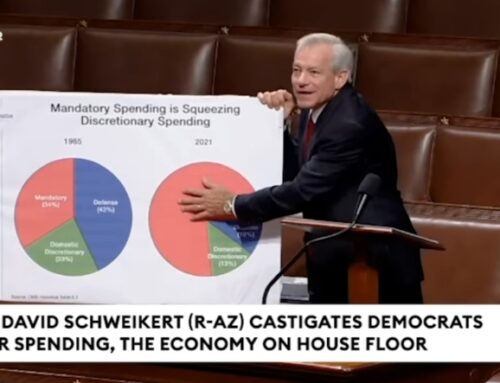Like many, I’m waiting for November when Congress will hopefully be in Republican control. However, I’m reminded of a question that Walter Williams’s economics professor asked him about some socialist economic policy: “What then?”
Say the Republicans actually take over Congress. What happens then? I haven’t heard anything about a Republican agenda. Where’s the Contract with America? Do they not have one, or do they fail to communicate?
Whatever happens in November, we cannot go back to business as usual, sleeping at the switch while Congress does what it wants. When the Republicans controlled Congress and the presidency, I don’t recall the deficit shrinking or the government operating within its constitutional limits. So how can we, the people at the grassroots, influence the men and women we choose to represent us to enact legislation that will reduce and eventually eliminate the deficit and the debt and eliminate the federal government’s unconstitutional involvement in areas such as education, health care, social welfare, and retirement?
Perhaps we could write the legislation.
Sound a little farfetched? Not at all. We’ve done it on the state level here in Virginia. Tea Party members helped write the Health Care Freedom Act which was passed and signed into law. We can do the same thing on the federal level.
Imagine that committees of Tea Partiers write short, clear, effective, constitutional legislation for Congress to eliminate the Department of Education. We contact Congressmen who enjoyed strong Tea Party support and request that they read the legislation and agree to sponsor it. Local Tea Parties across the nation which agree with the legislation could also request sponsorship from their Congressmen. Also, in the spirit of transparent government, we could post the legislation online and ask for public comment.
What then? We track the legislation, especially any changes made to it by congressional staffers. We stay in contact with Congressmen who are steering it through the House or Senate and with those who would attempt to stop it. We write letters to the editor about the bill and purchase advertising space in order to stir up public debate. Maybe I’m on the “and-I-want-a pony-for-Christmas” level, but we could even sponsor public debates on the legislation with people who oppose it. Why not expose the merits and flaws of the bill? Even with all that, the bill may get stuck in committee, lose in a House or Senate vote, or end up vetoed by the President.
What then? We get the bill reintroduced in the next session and go through the process again, and again, and again, and again, if need be. William Wilberforce introduced legislation banning the slave trade into the British Parliament for over 20 years before it passed. During the process, he and like-minded people educated the British people and Parliament on the evils of the slave trade partly through the legislative battles.
What then? Knowing the process, we get our congressmen to sponsor other bills we’ve written. Getting familiar with how Congress works, some of us get involved in our state Republican and Democrat parties and run for state and national office and actually abide by our oath to uphold and defend the Constitution by helping to enact laws to that effect.
At every stage of the process, instead of merely reacting to bad legislation, we’ll also be promoting good legislation to effect the changes our government and republic needs.





